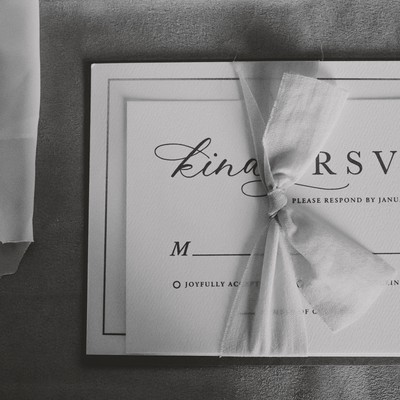

What To Do If… Your Guest List Is Out Of Control
Rachel Terrett
Founder of Salt and Scent says...
There are a few things to consider before committing to a guest list. What do you both want from the day? A big celebration or something more intimate? Do you plan for the ceremony to be in a church, registry office or venue? And do any family members have a say in who attends? Once you have a clear idea of what sort of day you want, sit down and create a draft list ranking the names in order of importance before you begin searching for the perfect venue. Importantly, before you send anything out, be sure to look at your budget. If you plan to provide a high-end experience to your guests, the costs can quickly escalate so be sure to do the maths first.
Over-inviting is a dangerous game. A bit like when hotels over book and assume that someone won’t turn up… inevitably they do, and it goes horribly wrong. In a world where we are so connected, your guests are likely to know the date and will have mentioned if they will be unable to attend prior to the invites even being printed. Typically, it was thought only 80% would make it, but based on recent experience it tends to be nearer 90%. It’s good to have a plan B list (have a few spare invites handy) so you can upgrade those that just missed the cut if any guests decline.
Everyone is busy and people do forget to RSVP. The worst culprits are often your nearest and dearest who assume you know they are coming. A polite nudge to those that haven’t responded by the cut-off date is perfectly acceptable; your caterers need to know final numbers and so do you.
/https%3A%2F%2Fsw18.sheerluxe.com%2Fsites%2Fsheerluxe%2Ffiles%2Farticles%2F2022%2F07%2Fnew1-wedding-guest-list.png?itok=JE0ryxlZ)
Gone are the days when you had to invite all your aunties, uncles and cousins. If you don’t see them, or you think they would be just as happy with an evening invite (or no invite at all), then trim away. And be clear on plus ones – by having individual names on the invites it makes it clear who it is intended for. Also, if you don’t intend to invite work colleagues then go easy on the wedding chat at work. If you work in a small office, tread carefully if you plan to invite some and not others. If you work in a larger company and want to invite just a few without upsetting others, then go ahead. You’ll know what to do. As for the relative you never see, don’t feel pressured into having them.
'No ring no bring' makes culling plus ones sound like an easy task. However, some couples have been together forever and choose not to marry, in which case this feels like an unfair rule. Don’t feel the pressure to invite plus ones – do so only if you want to and know their partner well. As for children, many couples choose to invite children of immediate family members and newborn babies, with others politely declined – parents are usually thrilled at the prospect of a night off! If you do decide to have children attending, remember to book childcare. There are great wedding creche specialists out there to keep them entertained and this will allow the parents to fully enjoy the day too.
Visit SaltAndScent.co.uk
Liz Taylor
Taylor Lynn Corporation CEO says...
It’s important to understand the guest list may be dictated to you – either by venue size or budget – so it’s good to have that ‘magic number’ in mind when you start inviting people. Begin with the people without whom you absolutely couldn’t celebrate your wedding. Who are your non-negotiables? That’s the A-list complete. Then, create the B-list by writing down everyone you could potentially invite from distant relatives to friends you’ve lost touch with. It’s easier to go large at this point then whittle it down later than keep adding to a guest list where you can easily lose track of who’s made the cut.
Set some boundaries early on. If you don’t want children at the wedding, now is the time to say. Similarly, if you have a rule about family members or plus ones that you’d like to consider, now is the time to decide this. And if you are having day and evening reception guests, separate them out early in the process so you can ensure the mix is right and you’re sticking to venue numbers. Also, if you’re going to give parents eyes on the final list, be ready to put your points across in a calm and positive manner – at the end of the day, it’s your wedding.
Send a save-the-date card at least 12 months ahead, asking any people who definitely can’t make the date to advise you then. That way you can take them off the guest list. Then, send your invitations in plenty of time to the A-list, with an early RSVP date. This will allow you to monitor responses and potentially send out a second batch of invitations to further, more distant family or friends. So guests don’t feel second best, simply explain more space has become available for the evening and you would love for them to join you.
There are ways to exceed the venue capacity. If it’s just a couple then there could be some wiggle room – as long as it’s still within health and safety regulations. Anything over ten and you may struggle to get the venue to agree to it. That’s not to say you will have to go for a completely different venue altogether. You could switch from tables of eight to tables of ten, or have long tables rather than round ones to increase capacity. If there’s space, you could expand into an adjacent room. If you’re worried, look for a venue with flexible partitioned space, where you can add room if numbers run high. Finally, there could be scope to set up a marquee in one of the outdoor areas, giving you all the benefits of the venue you love, while increasing the capacity.
For RSVPs, I would suggest a ‘polite chase’ around a week after the deadline. If you’re organised enough, you will have left plenty of time ahead of your venue’s final call. Do this once, then if you still haven’t heard back, send one more polite but direct message before writing them off the list. It may sound harsh, but you’ve given them plenty of opportunity to respond by this point. To not reply is, frankly, bad manners.
Unless you’re very close to work colleagues, I wouldn’t extend the invite to include them. If budget is no object, they could come along to the evening event. If it’s a bigger company, it’s fine to choose those you would deem as friends and just invite them. If it’s a smaller team then it’s trickier – I would stick to the rule of all or nothing otherwise you risk putting somebody’s nose out of joint.
Distant relatives are another personal choice. If you have a large family, it’s probably easier to stick to the rule of close family only. This might be one where you need to get a parent’s input to see if there are potential situations that could cause offence, e.g. you invite family from one side but not another. Personally, if you’ve not seen them or spoken to them in the last 18 months, I would leave them off the list, but every family is different.
If you’re inviting children, be sure to cater for them. An entertainer is a good investment, but at the very least some games and toys, especially on the tables, to keep little ones quiet during the speeches. Perhaps ensure a good baby change area too, and a separate quiet space or a chill-out room for the older kids.
Having been on the receiving end of a late wedding invite, I was still thrilled to be invited. You can always play the ‘late organiser’ card, it’s only eagle-eyed guests who will notice the invitation came later in the day. Or explain that you have decided to extend your wedding party to more guests, and so are delighted to be able to add them to the guest list.
Visit TLC-Ltd.co.uk
/https%3A%2F%2Fsw18.sheerluxe.com%2Fsites%2Fsheerluxe%2Ffiles%2Farticles%2F2022%2F07%2Fnew2-wedding-guest-list.png?itok=EEap9NK7)
Alice Wilkes
Wedding Planner says…
Putting together a guest list should fill you with joy not dread. If you’re unsure about inviting someone, try to envision them at your wedding. Are they going to enhance your day? If the answer is yes, they should make the list. If you can’t imagine getting married without them there, this is another sign to invite them. I would also suggest doing a priority send-out of save-the-date and RSVPs to your preferred guests, then sending a second send-out closer to the time for additional guests to ensure everything is still on track numbers-wise. People miss the RSVP deadline all of the time, but it’s a really important part of the planning process. Where possible, hold everyone to the RSVP deadline.
The rules around plus-ones will ultimately depend on your venue and initial guest numbers. If you can invite plus ones, it’s a treat for your friends. However, if you have to be strict don’t get too concerned about telling single friends they can’t bring someone.
I believe breastfeeding mothers should be allowed to bring their babies. However, inviting children more broadly depends on your situation – if you have close friends that have children and you can’t imagine your day without them, then the choice should be clear. If you choose not to invite children, be prepared to possibly lose one parent to babysitting duties.
If your parents are paying, it’s a nice gesture to let them invite close friends – albeit preferably ones you have a connection with. That said, if it’s choice between your friends and your parent’s friends, I don’t think it’s right that the couple miss out. Speaking of parents, if they’re divorced, it’s fine to invite new partners or children as long as everyone feels comfortable and can spend time together without arguments. Otherwise, it’s probably best to stick to blood relatives only and have an honest conversation about it ahead of time.
A good rule of thumb is to limit guests to pre or post-wedding events. It should only be close friends or family – or possibly only the bridal party. But if people are travelling a long way for your big day, especially internationally, it’s polite to extend an invite to these guests as a thank you for coming.
Visit AliceWilkes.co.uk
DISCLAIMER: We endeavour to always credit the correct original source of every image we use. If you think a credit may be incorrect, please contact us at info@sheerluxe.com.

